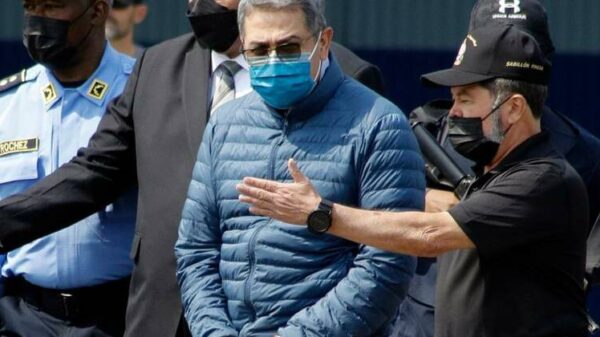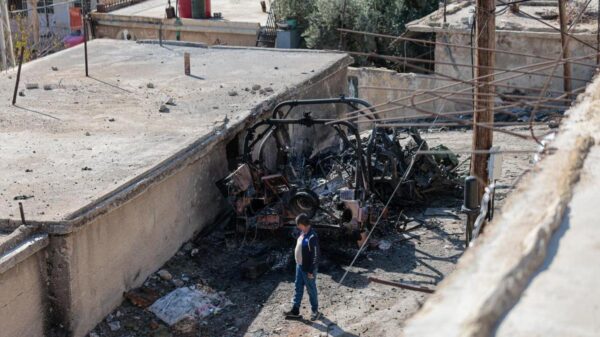US President Donald Trump has unveiled a new 20-point peace plan for Gaza, threatening to give Israel the authority to “finish the job” against Hamas if the militant group refuses to comply. Australian Prime Minister Anthony Albanese has welcomed the proposal, viewing it as a potential step toward ending the ongoing conflict. The plan seeks to establish a ceasefire and facilitate the release of hostages within 72 hours, with Trump and former British Prime Minister Tony Blair overseeing a temporary governing body for Gaza.
During a press conference at the White House, Trump emphasized the need for “eternal peace in the Middle East” and expressed gratitude to Benjamin Netanyahu, Israel’s Prime Minister, for his collaboration. The peace initiative has gained traction not only among Western leaders but also within the Arab world, as many nations pushed for Palestinian statehood at the United Nations. Albanese, returning from discussions in Abu Dhabi, stated, “I certainly have welcomed the opportunity to discuss the plans for a ceasefire moving forward.”
Hamas leaders claim they learned about Trump’s plan only after it was publicly announced. They have indicated a willingness to review it “in good faith” but face a challenging decision. The plan requires Hamas to disarm, relinquish any governing role, and accept a staged withdrawal of Israeli forces, with the prospect of amnesty for those who commit to peaceful coexistence. Additionally, those choosing to leave Gaza would be provided safe passage.
Netanyahu asserted that the conflict could be resolved “the easy way or the hard way,” urging cooperation from all parties involved. The proposal has drawn mixed reactions, particularly regarding its implications for Palestinian self-determination. Albanese’s deputy, Richard Marles, voiced support for the plan, provided it does not involve territorial annexation or forced displacement of individuals. He expressed skepticism about Hamas’ willingness to disarm, emphasizing the need for an end to hostilities.
The political landscape has shifted significantly as Israel faces decreasing support from its traditional allies. As the conflict approaches its two-year mark, the humanitarian crisis in Gaza worsens, prompting international concern. Former Israeli Minister Yossi Beilin suggested that Netanyahu may not have independently developed the plan, stating, “He had some impact on the plan, but some ideas, including hints about future Palestinian state, he hates.”
Under the proposed framework, Israel would gradually withdraw its troops while an international security force would step in. A “Board of Peace,” led by Trump and Blair, would govern Gaza’s administration and oversee reconstruction efforts. This plan differs from an earlier controversial proposal by Trump that suggested evacuating people from Gaza.
If Hamas rejects the deal, Trump has pledged full support for Israel to “finish the job of destroying the threat of Hamas.” Meanwhile, opposition parties in Australia criticized Albanese’s recognition of Palestine, arguing it undermined his role in the negotiations facilitated by the United States. Opposition Leader Sussan Ley remarked, “We all want to see the war end, and we always knew that the only peace that could be brokered would be brokered by the US.”
Coalition Senator Dave Sharma, a former ambassador to Israel, remarked on the implications of Australia’s foreign policy, suggesting that recent recognitions of Palestine could alienate Australia from critical discussions. Alex Ryvchin, co-CEO of the Executive Council of Australian Jewry, criticized Western governments for “gesture politics” at the UN, noting that the US administration has crafted a potential mechanism for peace.
The alignment of various international leaders, including French President Emmanuel Macron and British Prime Minister Keir Starmer, reinforces the urgency surrounding the proposal. The foreign ministers of several countries, including Qatar, Jordan, and Saudi Arabia, have acknowledged Trump’s efforts to advance peace.
As the conflict persists, Hamas continues to hold an estimated 48 hostages, with reports indicating that around 20 are believed to be alive. The war began following a Hamas-led attack in March 2023 that resulted in approximately 1,200 fatalities and 251 hostages taken in Israel. Gaza health authorities estimate over 66,000 Palestinians have died due to the ongoing Israeli military actions, a figure that does not distinguish between combatants and civilians.
As the situation develops, the potential for a new era of negotiations and peace remains uncertain, but the stakes are undeniably high for all parties involved.





























































